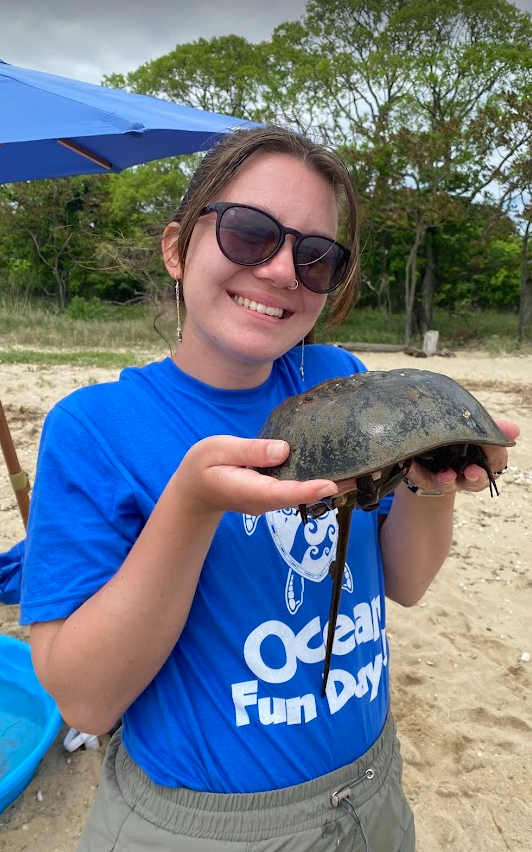
MAJOR AND MINORS
- Environmental Studies Major
- Anthropology and Chesapeake Regional Studies Minors
EXPERIENTIAL LEARNING
- Youth Program Intern with the Friends of the Eastern Neck National Wildlife Refuge
- Teaching Assistant for Department of Biology
CAMPUS ACTIVITIES
- Center for Environment & Society Fellow, Peer Tutor at Writing Center
- Washington College Food Recovery Network, President; Campus Garden, Outreach Manager
- “The Washington College Center for Environment and Society gave me exposure to tons of professionals in my field and various career paths I could take, access to information and research being done locally and globally, unique experiences like sailing the Chester River on a historic schooner, and the personal connections that I had the privilege of forming with faculty members who became mentors and with peers who became dear friends.”

Sharing a Changed Perspective
Alaina Perdon '22
Fisheries Technician at the New Jersey Fish & Wildlife Bureau of Marine Fisheries • Forked River, New JerseyMAJOR AND MINORS
- Environmental Studies Major
- Anthropology and Chesapeake Regional Studies Minors
EXPERIENTIAL LEARNING
- Teaching Assistant for Department of Biology
CAMPUS ACTIVITIES
- Center for Environment & Society Fellow, Peer Tutor at Writing Center
- Washington College Food Recovery Network, President; Campus Garden, Outreach Manager
- “The Washington College Center for Environment and Society gave me exposure to tons of professionals in my field and various career paths I could take, access to information and research being done locally and globally, unique experiences like sailing the Chester River on a historic schooner, and the personal connections that I had the privilege of forming with faculty members who became mentors and with peers who became dear friends.”
Certainly, her environmental studies major helped plant the seeds for this early-career
success. But Perdon also counts her participation as a fellow in the Washington College
Center for Environment & Society (CES) as just as impactful.
“I now realize how absolutely critical CES has been in shaping the person I became through undergrad and beyond,” she says.
Initially, Perdon thought of CES as “some kind-but-vague entity” that would give her a scholarship and arrange an internship for her. Well, an internship did materialize—with Friends of Eastern Neck National Wildlife Refuge in Kent County, Maryland. But that was just the beginning. As a CES fellow, Perdon participated in the Chesapeake Semester, which engages Washington College students in a semester-long interdisciplinary study of the Chesapeake Bay and in fieldwork in Central America.
Perdon raved about her experiences in the Chesapeake Semester, in which she and nine other students embarked on a series of “journeys,” each with a different focus. Among other things, they toured Virginia's historic Jamestown and Mount Vernon, learning the history of those who settled the land and how the ecosystem functioned before colonization. They kayaked the flooded streets of Smith Island in Maryland's southern portion of the Chesapeake to observe the impacts of sea level rise and a changing climate. They held baby chicks on a farm in Kent County to learn about the policies impacting agricultural production on the shore.
And on a trip to Belize and Guatemala, they learned that “the issues faced by a culture that surrounds a watershed aren't terribly different across international borders.”
“The Chesapeake Semester completely changed my perspective on the environment, environmental issues, and how we interact with our landscape, strengthening my sense of place and radically altering the way I interact with the world around me,” Perdon said. “It is a huge part of why I wanted part of my career to include an element of outreach, to inspire others to realize their position in their ecosystem and the fascinating nuances at play in the world around them.”
— Ken Keuffel